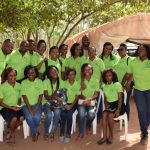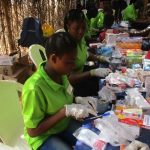Every 25 May, the world unites to celebrate World Africa Day, a significant occasion also to refute stereotypes and recognise the true potential of this vast continent. While Africa faces complex socio-economic challenges, it is important to highlight the vital role of individuals and local authorities working tirelessly to combat poverty and provide opportunities for growth. Nkechi Asogwa, a Nigerian doctor and founder of the non-governmental organisation Doctor’s Health Initiative, whom we interviewed in Rome recently, agrees with this.
Asogwa shared her experience and passion for change with us. A general practitioner in Lagos, she is actively involved in supporting family health and women’s health in particular. With a clear vision of the need to prevent avoidable deaths of children and people with illnesses, she has dedicated her life to providing quality medical care, especially to those who cannot afford to pay for such services. She is the current president of DHI, which is committed to human rights; since 2008, DHI has been implementing programmes to assist internally displaced persons (more than three million, due to violent extremism in the north-east of the country) by providing health services, basic necessities and food.
Below is the full transcript of the interview.
Nigeria is among the fastest growing countries where, however, still a majority of the population lives in poverty. What are the biggest obstacles to sustainable development and for all?
Nigeria is known to be the fastest growing economy, at least one of the fastest growing economy yet many of the people live in poverty, they lead below one dollar per day so there are several obstacles to sustainable development for all Nigerians; a key one is lack of empowerment, we have a thriving youthful population who are very intelligent and hard working but they need some skillset that empowers them, that gives them the entrepreneurship skills they need.
Another thing is education, quality education that will give them the opportunity to be problem-solving oriented; another one is of course funding: after all, you need funds to sort out the problems you have identified thanks to training; and then we need some government policies and security because right now a number of country is being terrorized by BOKO HARAM insurgent in the North but also there are several herdsmen that creates a lot of insecurity in the country and this doesn’t give a very good opportunity for economic growth; we also lack the basic infrastructure, lack of electricity, water, good roads and so on. There are so many key issues that are still… and of course also we do not have decorate health facilities to take care of many people who are suffering from different illnesses that could be easily treated.


What are the challenges facing your Ngo?
Since the start of the BOKO HARAM in Nigeria more than 20 million people have been displaced from their homes and this is a catastrophic event that everybody should know. Thanks to my Ngo ‘Doctor’s Health Initiative’ which is a women’s leader non-governmental organization in Nigeria, we are helping these people, especially the women and children who are highly traumatized, they had to flee from their homes abandoning their livelihood because of the situation. We offer them affordable and quality health care with the help of our sponsors, friends and families we go to the internally displaced people’s camps and we set up cleanings, we identify the health needs of the communities, then we deal them with a professional help: we manage clinics dealing with mental health problems, gynaecological problems, paediatrics and so on; so in principle we look at for what is the gap, what is the need of this community those internally displaced people group or on the set communities in Lagos and in various parts of the country and then we offer them good and affordable medical services.
What made you want to become a doctor
I decided to study medicine as a concrete way of helping and supporting people in need. That was because growing up I could see all around me different stories, you hear stories about people and dying, especially children, I remember my mother losing a child, I was I was like seven years old but the whole family was affected and it was from malaria that was my younger sibling, I don’t remember what that was a boy or a girl but that’s memory remained with me, a little baby dying and this is very common in Africa and I told myself my family is not very rich, we came from a middle class family and I told myself I really want to help and prevent children and other people from dying from unnecessary illness, so I put the effort to study and I put effort to do medicine which is a very tough course to do in Nigeria and here I am today living the dream I’ve always wanted: to learn to give a hand to communities, to people, women, girls, children, especially that cannot affair afford good medical care.
May 25 is World Africa Day, what is the significance of this day and how could the international community give concrete meaning to this day?
So, May 25 is the World African day and it to be a very good opportunity to break some of the stereotypes that Africa is known for. In general, the stereotypes are that Africans are very poor, very lazy people, they all want to live their countries and go to developed countries but really that’s not the true African the true African is hard working, is family oriented and want to be a part of a community that is sustainable and take care of itself. So I’m thinking that celebrating the World African day is a time for the international community to give Africans a place in the global community, to listen Africans tell us the story, what are our needs, what do we want and how can we as Africans be part of the international community by making our own contributions; Africa has a lot of human resources and we can do a lot with that, we have cultural values, we have family values, we can contribute towards the whole world as well so there’s a lot we can do from Africa; apart from our natural resources which are also being which have been exploited from all the colonization that is going on in a new form ,because of the different ways that governments are African governments are being forced to change the belief and cultural and religious belief of their people in other to get economic help, but that’s not us, we Africans believe that when Africans are given the chance we can prove ourselves even in the global communities and many Africans doing fantastically well on the global field.
